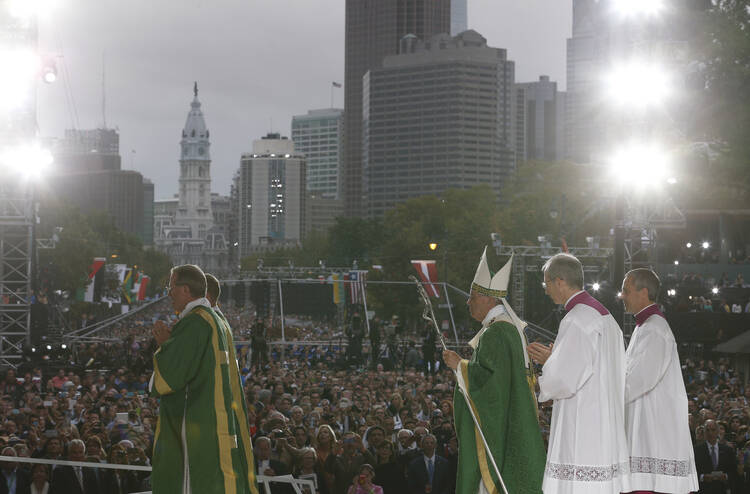The next World Meeting of Families will be held in Dublin, August 22-26, 2018. It will focus on Pope Francis’ exhortation “Amoris Laetitia” (The Joy of Love) and “should be a world event even in its preparation,” Archbishop Diarmuid Martin told a Vatican press conference today.
This global gathering “is an event of the whole church” and “will be an important milestone” in the application of the fruits of that synod process and of the exhortation, “which has been very well received in Ireland,” he said.
The papal exhortation is “the Magna Carta” for the Dublin meeting, said Archbishop Vincenzo Paglia, the president of the Vatican’s Council for the family, which is helping prepare for the event.
Archbishop Martin revealed that Pope Francis told him “it is my desire to come” and, he added, “It is our hope; it is the hope of Irish Catholics that he will indeed come.” If this happens, he said, the Catholic bishops of Ireland would like him to visit Northern Ireland too. He recalled that John Paul II had wanted to go there when he visited the country in 1979 but was prevented from doing so “for security reasons,” and so they hope Francis can do so.
The choice of Dublin for the next World Meeting of Families was announced in Philadelphia in September and not long afterwards, on the first day of the 2015 synod in Rome, Archbishop Martin recalled that Pope Francis came up to him and said, “Remember, Dublin begins today.”
In Pope Francis’ mind, he said, the Dublin meeting “is not an isolated event. It belongs within a process of discernment and encouragement, of accompaniment and animation of families. It belongs within a program of renewal of the church’s pastoral concern and pastoral care for the family and for families.”
Archbishop Martin said “the meeting will be a significant event for the church in Ireland and for Irish families.” He emphasized the fact that Ireland “has a strong family culture.” Moreover, it is “a young country” with 21.6 percent of its population of six million under the age of 15, and only 16.9 percent over 60. He noted that Ireland has a much higher marriage rate than Italy and a much lower incidence of divorce. Moreover, the fertility index in Ireland is 2 whereas in Italy it is 1.4, well below replacement level. At the same time he acknowledged that “many families” in Ireland “struggle” because of their precarious economic situations and the housing crisis.
Ireland is “a very open country and is open to all the pressures of Western secular culture regarding marriage and the family,” the archbishop stated.
He drew attention to the fact that the theme chosen for the 2018 Dublin meeting of families seeks to emphasize “the role of the family within society and the contribution of families to the overall health and stability of society.”
In Ireland, he said, the church’s catechetical programs regarding marriage and the family “need a complete overhaul in line with what ‘Amoris Laetitia’ sets out.” He said the Irish church will prepare for the Dublin meeting “by a process of catechesis—based on the Apostolic Exhortation—which will take place right across the church in Ireland during 2017.” It is hoped too that something of that Catechetical process “will be shared with other churches around the world, especially in Europe where we share many of the same challenges.”
Drawing on his wide experience, having attended the 1980 synod on the family held by John Paul II and the 2014 and 2015 synods under Pope Francis, Archbishop Martin insisted that “the family is not just the object of the attention of the church.” Indeed all three synods emphasized “the vital role of families as real protagonists of renewal and of the transmission of the faith to the coming generations.” He said families do this “through being active participants in the ministry of the church” and “above all though the authenticity of their daily life in the family and in the home” where “spouses witness to God’s tender love through their own mutual love and through the care and formation of their children.” The 2018 World Meeting of Families “must be an occasion to encourage and sustain families in this task,” he stated.
CORRECTION, May 24: This article originally incorrectly referred to the Magna Carta as the Magna Charta.








